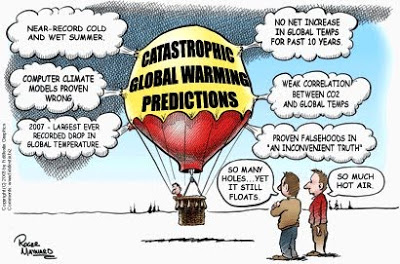 By Patrick J. Michaels
By Patrick J. Michaels
Desperate Strategies for Desperate Times . . . and Post.
On August 18, both the New York Times and Washington Post featured uncharacteristically shrill top-of-masthead editorials demanding immediate climate-change legislation. The Post warned of an imminent geophysical “tipping point” because of global warming, while the Times went one better, threatening the national security of the United States.
Why the desperation? Perhaps because the great unwashed who live outside the Beltway or somewhere other than Manhattan are in open revolt, and not just against Obama’s health care proposals. In their role as the nation’s opinion leaders, these mastheads can’t let such behavior go unchallenged.
Things are getting out of hand in the real world. Since the June 26 House vote on the Waxman-Markey cap-and-trade bill, lawmakers from both chambers have backed significantly away from the legislation. The first raucous town-hall meetings occurred during the July 4 recess — before health care. Voters in swing districts were mad as heck then, and they’re even angrier now. In order to rescue global-warming regulations the Post thinks people can be mollified by ditching the detestable 1,400-page cap-and-trade bill, while the Times thinks they can be pandered to by appealing to their patriotism.
The Post resignedly confesses its favored approach to the warming menace: “Yes, we’re talking about a carbon tax.” The idea there is that a carbon tax will be less complicated than cap-and-trade (true), and that the cost to individuals and businesses “could be rebated . . . in a number of ways.”
While ostensibly tackling the all-encompassing peril of global warming, the Post would have Congress rejigger other areas of the tax code to achieve a zero net loss in economic productivity or jobs. Right.
The Times, meanwhile, accurately notes that “proponents of climate change legislation have now settled on a new strategy: warning that global warming poses a serious threat to national ” and that absent regulation, global warming could induce resource shortages that would “unleash regional conflicts and draw in America’s armed ”
Utter nonsense. Every nation is short of some kind of resource, and the supply of many are dependent upon year-to-year fluctuations in weather, as well as to long-term fluctuations in climate. This is why we have markets. It’s too cold in Canada to buy corn, so they import ours and export ice hockey. Markets are always more efficient than Marines, and will doubtless work with or without climate change.
Cynically, the Times admits that “this line of argument could also be pretty good politics — especially on Capitol Hill, where many politicians will do anything for the Pentagon. . . . One can only hope that these arguments turn the tide in the Senate.” Militarization of domestic issues is often the last refuge of the desperate. How many lives has this cost throughout history?
Simultaneously, the evidence for this climatic tipping point has gone AWOL. Global surface temperatures haven’t budged significantly for 12 years, and it’s becoming obvious that the vaunted gloom-and-doom climate models are simply predicting too much warming.
Nor will any conceivable law do much about climate change. If every nation on earth that has obligations under the United Nations’s failed Kyoto Protocol on global warming successfully adopted the Waxman-Markey cap-and-trade approach, only 7 percent of the warming forecast by the UN’s own “midrange” climate models would be prevented over the course of this century. By mandating a reduction of over 80 percent in current emissions by 2050, Waxman-Markey will allow the average American the same carbon dioxide emissions of the average American in 1867.
Alternatively, consider the Post’s energy tax. How high does it have to be?
The last time gasoline hit $4.00 a gallon, we managed to reduce our consumption by a grand total of 4 percent. How high does the price have to go to knock out 80 percent? The answer is pretty simple: no one knows, because a technologically and politically feasible alternative does not exist. How expensive will fossil-fuel powered electricity become?
Nonetheless, one must admire the Post and Times for their altruism. The economic distress caused by a carbon tax, militarization, or any other radical climatic policy certainly won’t be good for their already shaky finances, unless, of course, the price of their support is a bailout by the Obama administration.
Now that’s cynical.
— Patrick J. Michaels is senior fellow in environmental studies at the Cato Institute and author of Climate of Extremes: Global Warming Science They Don’t Want You to Know.Source